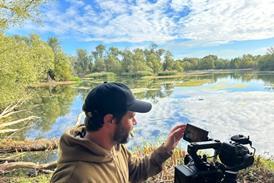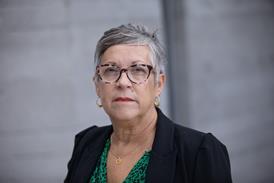When the Foreign Office website says your next destination is a place they advise people to avoid, I suppose it's inevitable that a frisson of fear ripples through you as the plane door opens. I was on a research trip to Daghestan, an Islamic republic of Russia between Chechnya and the Caspian Sea. The man I was looking out for was said to be an expert in carpets called Khan.
As soon as I met him, I realised I'd struck gold: carpets turned out to be a sideline; Khan was a clan leader, bon viveur, professor of languages and a lot more besides. Within days, he had guided me through encounters with hard-drinking Cossacks and surly policemen, requisitioned his brother to sort out transport and promised to ensure the team's security with a certainty I knew I could rely on.
The series I was setting up was built around a simple proposition - who and what do you see on a journey from one tip of Russia - Murmansk in the Arctic Circle - to Vladivostok on the Pacific. I don't suppose many Russians have made the same trip, let alone foreigners, and I can now admit I underestimated the sheer complexity of getting to the places I blithely marked on a map before we started.
Fortunately I was sharing the task of producing this series with Teresa Cherfas who'd worked in Russia on and off for years, and had a brilliant understanding of how everything operated. She is fluent in Russian, of course, but those words don't do justice to the empathy she quickly established with almost anyone she met. Time and again, it meant we were passed on as friends rather than dollar-bearing foreigners to the next stop down the line, which was vital whenever the going got tough.
One such moment was in the wilderness, north of Irkutsk. We'd gone in search of a Buryat shaman who was famous locally for his powers of healing. We were in a Japanese 4x4, driven by Dima, a man who normally managed a hunting lodge for well-heeled visitors from Moscow. Some bears had apparently broken in to the compound that morning and he kept making detours over the rough terrain to find somewhere from where his mobile would work. The first tyre burst just after we'd reached the shaman's sacred tree. He put on the spare and we headed back to the road. Then in quick succession two more went. We were stuck. No food, little water, and a long walk to the nearest settlement. Dima seemed far more embarrassed about having bought cheap tyres than the possibility we might expire where we stood. And he was right. After an hour or so two more 4x4s came along in convoy. Our driver went off to get tyres in one of them and we hitched a ride back to Irkutsk in the other. Things just have a way of working out in Russia, but you have to be patient.
Other things to remember: maps shrink distance and can be woefully misleading when you try to calculate the time it'll take to get to the next town. And don't underestimate the weather. The 20 below in winter can make camera cables as brittle as uncooked spaghetti, while the searing heat of summer breeds swarms of mosquitoes. There was a last minute panic before one filming trip when we found that the Urals, where the team was heading, had reported an unexpectedly early epidemic of tick-born encephalitis. No time for jabs, so we followed local advice: wear long socks and high boots. It worked.
Don't expect everything to conform to the health and safety standards laid down in broadcasting guidelines. The Russian helicopter pilots are great but they don't always carry the airworthiness certificates insurers expect back home. You simply have to take a view on the ground.
One afternoon last summer I'd planned to recce a remote section of the Lake Baikal shoreline. It was occasionally served by a train but otherwise could only be approached by boat. A fishing trawler was going to take us until the captain went missing indefinitely. Moored at the quay was a 12 foot tin dinghy with a powerful engine. It didn't look very safe, and the owner said he'd need something extra because the wind was getting up. But I didn't think he looked the sort of guy who'd risk his life for 60 quid, so I shelled out and we set off. We arrived okay, of course, but I was glad the train turned up to take us back by land!
Russia - A Journey with Jonathan Dimbleby is a Mentorn Media production for BBC2. It airs on Sunday 11 May at 10pm
George Carey: My tricks of the trade
Buy a local phone card to put in your mobile. It's a fraction of what it will cost you to use a Blackberry.
Stuff your pockets with small presents. The further you get from Moscow, the better a packet of English breakfast tea goes down, even at police road blocks.
Pack a digital camera. You're going to be seeing things you'll never see again, and in remote areas people love seeing pictures of themselves.
Get a phrase book. No one expects you to be fluent, but a few words go a long way when you're toasting them in vodka.
If you like coffee in the morning, take some with you. In many parts of Russia, even Nescafé is a luxury.


























No comments yet